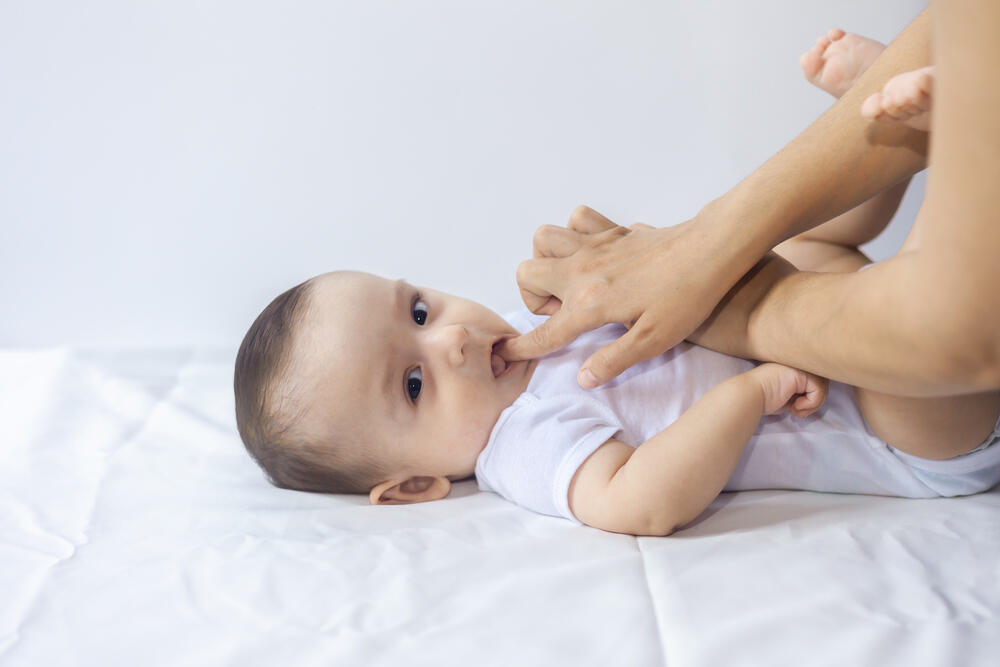Since a teething infant may be painful, many parents look for tips on how to calm them. Fortunately, there are a variety of effective at-home treatments for babies who are teething. Continue reading for advice on how to comfort a teething infant, as well as suggestions on what to avoid and how to take care of your child’s new set of teeth.
Chilled fruit
A pleasant snack of chilled mashed bananas, applesauce, strawberries, melon, or other soft fruits might help ease those painful gums once you’ve introduced your infant to solid meals, usually around 6 months.
Chilled washcloth
It doesn’t get any easier than this solution if you’re wondering how to soothe a teething infant! Place a clean washcloth in water, wring it out until it’s barely moist, and then put it on a spotless surface in the refrigerator. When it has cooled, fold it and offer it to your child to chew on to soothe their sore gums.
Cool metal spoon
What can you find around the house that is helpful for teething? Spoons! Take a tiny metal spoon out of the drawer in the kitchen, and place it in the refrigerator. When the spoon has cooled, gently brush your child’s gums with the curved side.
Chilled, non-gel teething toy
If you’ve read this list all the way through, you may have noticed a pattern: chilly items. One of the most effective methods for reducing teething discomfort is to apply something cool (but not freezing) to your baby’s gums.
You may put your baby’s favorite rubber teething toy in the refrigerator. Before giving it to your child, let it cool and make sure it’s clean. Pick a teething toy that is simple for your child to grasp. Avoid teething toys made of solid plastic or wood and toys packed with gel, as these items may shatter or freeze when chilled.
Gum therapy
One of the finest teething therapies for pain alleviation is a light gum massage. Use your fingers to gently touch your baby’s gums in a circular motion after cleaning your hands. It’s okay if your infant naturally begins to suck or chew on your fingers.
A hot bath
It’s not always enough to just rub the baby’s gums to calm them down. Give your child a nice, tranquil bath. It can calm their body and serve as a pleasurable diversion from pain.
Even if including a bath in your child’s nighttime routine is a smart move, try to avoid making too many other changes. The sleep routine of your newborn might be upset by even a small number of changes.
Removing drool
Drooling is one of the primary symptoms of teething and can result in a drool rash. Soft bibs may help preserve your baby’s skin and clothing, and you can use them to wipe your child’s chin to keep their face clean and dry.
Cuddles
Make sure your infant receives plenty of cuddles and embraces. An infant who is teething may find that spending time cuddling with you is the greatest comfort. Choose a cozy chair, then gently rock your infant. This will provide you both some much-needed alone time for hugs and consolation, in addition to some peace and quiet.
Medicine for infant teething
Ask Pediatric Dentist Indianapolis IN for guidance on utilizing painkillers or infant teething medications if you’re worried that none of the aforementioned remedies will be able to ease your baby’s teething discomfort. Some parents understandably have concerns about giving their children medications like infant acetaminophen for toothaches. The ideal person to ask this question to is your Pediatric Dentistry Indianapolis IN, who can advise you on the best over-the-counter medication and ensure that the right amount is utilized.
Treatments for teething: things to avoid
A wealth of information is available on what to offer a teething infant, but you should be aware that not all teething remedies are suitable for your child. Something that will calm their gums and is secure is the finest teething remedy for infants. So, it’s advisable by Kids Dentist Indianapolis IN
to stay away from the following:
- Frozen medications. It might be tempting to freeze your baby’s teething toy or give them a frozen treat as solace. Baby teething cures that include freezing, however, can do more harm than good since frozen objects are too cold and hard for your child’s tender gums.
- Necklaces for teething. Experts do not advise teething bracelets, necklaces, and other jewelry because the little pieces might break free and present a choking risk. Additionally, oral injuries, infections, and, in rare instances, strangling can all result from teething necklaces.
- Stiff teethers. Health professionals also advise against using hard teething toys made of plastic, metal, or wood. Stick to rubber teething toys, which are kinder on your baby’s gums.
- Specific infant teething drugs. Whatever your child’s doctor prescribes is the finest teething remedy. Many baby teething gels and creams might wash out of your child’s mouth before they have a chance to work or can be hazardous if ingested in big quantities. For instance, benzocaine or lidocaine-containing medications have the potential to be lethal.
- Teething remedies are sold over the counter or through homeopathy. Remember to follow your baby’s doctor’s instructions using teething gels, ointments, pills, or other infant medications. Some popular components, like belladonna, have been connected to health problems, including seizures.
When to contact your baby’s medical professional
Understanding when to notify your baby’s healthcare practitioner is helpful in addition to knowing what to avoid when it comes to teething soothers.
Many parents, particularly at night, question if teething might result in fever. The majority of the time, teething does not result in fever, despite the possibility of a somewhat increased temperature, sometimes known as a low-grade fever. It’s not probable that your child is teething if their rectal fever is greater than 100.4 degrees Fahrenheit; therefore, you should call their doctor. In addition to discussing fever with your baby’s doctor, get in touch with them if any of the following apply:
- Uncontrollable sobbing. Tooth-related pain or excessive sobbing is not acceptable. Since teething won’t cause severe or unbearable pain, learning how to calm a teething infant is about easing minor discomforts.
- Diarrhea. Similarly, if your infant has diarrhea, teething is generally not the cause.
- Diminished appetite. Feedings shouldn’t necessarily stop because of swollen and painful gums, even if teething can induce these symptoms. If your kid seems to be losing their appetite due to teething or if the discomfort prevents them from eating or drinking, contact Children Dental Center Indianapolis IN.
Contact Pediatric Dentistry Indianapolis IN for any problem related to your kid’s tooth.



